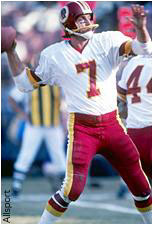
|
Saturday, Jan. 30 5:24pm ET NFL careers defined by Super Bowl |
||||
I won a Super Bowl championship with the Washington Redskins in 1983. Here it is 16 years later, and I'm still invited about 200 times a year to talk to different corporations and organizations about winning. An awful lot of it has to do with that victory over the Dolphins in Super Bowl XVII.
Because I've won a Super Bowl, people are interested in knowing how you become the best at what you do. I was a part of the best. So personally, that one game catapulted me into the category of winner. That's how it affected my life.
But there are other classic examples of how Super Bowls can define a quarterback's career. When Doug Williams won the Super Bowl with the Redskins in 1988, he had played in only five regular-season games that season as he split time with Jay Schroeder. Yet whenever anyone talks about Williams winning a Super Bowl, they say, "Boy, didn't he have a great season." Truthfully, he didn't.
In the NFC Championship Game against Minnesota that year, Williams completed only nine of 26 passes for 119 yards. Then he had one great quarter against the Broncos and was the Super Bowl MVP. So even though Williams played a very short period of time for the Redskins that season, his entire career has been capsulized into that one game, which tells you about the magnitude of the Super Bowl.
Take Jim Kelly, for example. Kelly went to four consecutive Super Bowls, which is a spectacular feat. But because he didn't win one, what's his legacy today? Unfortunately, the former Bills quarterback is considered a Super Bowl loser. That's how that game defines who you are as a player. People don't remember Stan Humphries or Craig Morton or Vince Ferragamo or David Woodley because they all lost Super Bowls.
Then there's John Elway, who had been to three previous Super Bowls before last year's game. Everybody was saying, "Ah, poor John. He hasn't won it." You haven't heard a "Poor John" statement since last year. His legacy was always as the greatest comeback quarterback in NFL history. But now nobody talks about that. They talk about Elway as a quarterback who won a world championship.
I believe something that Sean Jones said to me two years ago before Green Bay won the title: If you can win a Super Bowl, your career has been validated. I talked to Elway before last year's Super Bowl. I asked him, "Will your career be complete if you don't win the Super Bowl?" And he said, "I think so because I feel like I've accomplished a lot. I feel like I've enjoyed the game. So I personally think that my career will be fulfilled."
Then I talked to him at the ESPYs. I said, "John, I'm going to ask you the same question I asked you before the Super Bowl. Do you think your career would have been complete without the Super Bowl." And he said, "God, no." He said, "If I would have known what this would mean in my life, I couldn't possibly have gone without it." That tells the story.
I think Elway will retire at the end of the Super Bowl no matter what, and I think he should. Either way, he goes out a winner because he's won one title. I won my first Super Bowl and lost my second one, but there's satisfaction in the fact that I have been a world champion.
Joe Theismann, who played in back-to-back Super Bowls in 1983 and 1984, is an NFL analyst for ESPN and a regular contributor to ESPN.com.
|
| Copyright 1995-98 ESPN/Starwave Partners d/b/a ESPN Internet Ventures. All rights reserved. Do not duplicate or redistribute in any form. ESPN.com Privacy Policy (Updated 01/08/98). Use of this site signifies your agreement to the Terms of Service (Updated 01/12/98). |

